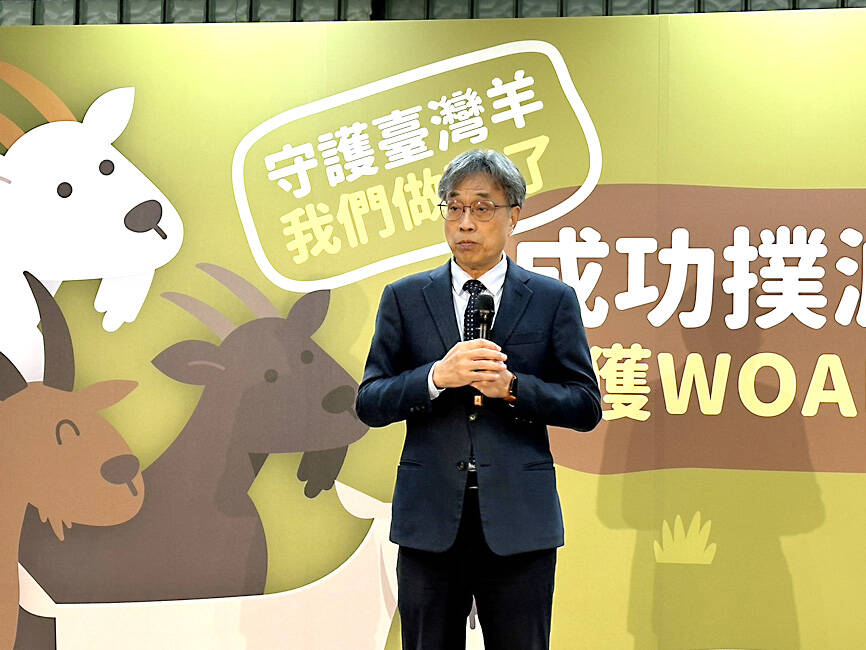The World Organisation for Animal Health (WOAH) has classified Taiwan as free of goat pox, the Ministry of Agriculture said on Thursday, adding that the status would greatly benefit the nation’s goat farming industry.
The WOAH status was made public on Tuesday, about three months after Taiwan applied for the change to be made, the ministry said in a press release.
Acting Minister of Agriculture Chen Junne-jih (陳駿季) said he welcomed the news with “great excitement,” adding that it was the result of a decade of effort by Taiwan’s authorities and farmers to eliminate goat pox, which was first detected in the nation in 2008.

Photo: Yang Yuan-ting, Taipei Times
The ministry would continue to help goat farmers upgrade their farms and equipment, for example by bringing in cold-chain logistics management and milk storage tanks, given that the industry has “huge potential for growth,” Chen said.
The objective is for Taiwan to establish itself as a robust producer capable of supplying goat products domestically, which would lower dependence on imports and reduce the nation’s carbon footprint, he said.
Official data showed that there are 33,002 dairy goats at 190 farms nationwide, with production worth approximately NT$401 million (US$12.85 million) annually — entirely for domestic consumption.
There are 83,494 meat goats at 1,462 farms, representing business worth NT$911 million annually, the data showed.
WOAH lists goat pox as a deadly viral disease caused by capripoxvirus. Live and inactivated vaccines are used to control the disease.
A region is considered free of goat pox when the disease has not been detected for at least three consecutive years, with the period starting six months after the slaughter of the last affected animal, the WOAH Web site says.
Animal and Plant Health Inspection Agency deputy director-general Hsu Jung-pin (徐榮彬) said that the first goat pox case was confirmed in Taoyuan in 2008, prompting the culling of 210 of the animals.
There was an outbreak two years later, leading to about 23,740 goats being culled, about one-quarter of the total number in Taiwan at that time.
Many goats were getting sick every day and there was “no way to stop” the spread of the virus until the vaccine became available, Goat Farmers’ Association director-general Lin Chun-chin (林浚琛) said of the situation in 2010.
Even though goat farmers were reimbursed for the culls, many were upset at having to kill animals that they had in some cases reared for more than a decade, Lin said.
However, the situation greatly improved after vaccinations began two months after the outbreak, Hsu said, adding that Taiwan’s last detected goat pox case was in Changhua County in February 2012.

SHIPS, TRAINS AND AUTOMOBILES: The ministry has announced changes to varied transportation industries taking effect soon, with a number of effects for passengers Beginning next month, the post office is canceling signature upon delivery and written inquiry services for international registered small packets in accordance with the new policy of the Universal Postal Union, the Ministry of Transportation and Communications said yesterday. The new policy does not apply to packets that are to be delivered to China, the ministry said. Senders of international registered small packets would receive a NT$10 rebate on postage if the packets are sent from Jan. 1 to March 31, it added. The ministry said that three other policies are also scheduled to take effect next month. International cruise ship operators

HORROR STORIES: One victim recounted not realizing they had been stabbed and seeing people bleeding, while another recalled breaking down in tears after fleeing A man on Friday died after he tried to fight the knife-wielding suspect who went on a stabbing spree near two of Taipei’s busiest metro stations, Taipei Mayor Chiang Wan-an (蔣萬安) said. The 57-year-old man, identified by his family name, Yu (余), encountered the suspect at Exit M7 of Taipei Main Station and immediately tried to stop him, but was fatally wounded and later died, Chiang said, calling the incident “heartbreaking.” Yu’s family would receive at least NT$5 million (US$158,584) in compensation through the Taipei Rapid Transit Corp’s (TRTC) insurance coverage, he said after convening an emergency security response meeting yesterday morning. National

PLANNED: The suspect visited the crime scene before the killings, seeking information on how to access the roof, and had extensively researched a 2014 stabbing incident The suspect in a stabbing attack that killed three people and injured 11 in Taipei on Friday had planned the assault and set fires at other locations earlier in the day, law enforcement officials said yesterday. National Police Agency (NPA) Director-General Chang Jung-hsin (張榮興) said the suspect, a 27-year-old man named Chang Wen (張文), began the attacks at 3:40pm, first setting off smoke bombs on a road, damaging cars and motorbikes. Earlier, Chang Wen set fire to a rental room where he was staying on Gongyuan Road in Zhongzheng District (中正), Chang Jung-hsin said. The suspect later threw smoke grenades near two exits

The Forestry and Nature Conservation Agency yesterday launched a gift box to market honey “certified by a Formosan black bear” in appreciation of a beekeeper’s amicable interaction with a honey-thieving bear. Beekeeper Chih Ming-chen (池明鎮) in January inspected his bee farm in Hualien County’s Jhuosi Township (卓溪) and found that more than 20 beehives had been destroyed and many hives were eaten, with bear droppings and paw prints near the destroyed hives, the agency said. Chih returned to the farm to move the remaining beehives away that evening when he encountered a Formosan black bear only 20m away, the agency said. The bear